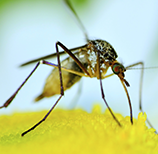Overview:
Feline heartworm disease is caused by a worm called Dirofilaria immitis. While it’s not important that you remember the name of the parasite, it is important that you know what it does and what you can do to prevent it. Heartworm affects both cats and dogs and can lead to a wide variety of problems for both.
Heartworm is spread by mosquitoes. The mosquito ingests the baby heartworms (also known as microfilaria) from an infected source and, after a period of time, transmit them to a new host. Current infection rates for cats vary from state to state but are generally lower in cats than in dogs. Both indoor and outdoor cats have been shown to be susceptible to heartworm. Although outdoor cats have a better chance of coming into contact with mosquitoes and a greater likelihood of contracting the parasite, indoor cats are by no means safe.
Upon entering a new host through the mosquito bite, heartworm larvae will migrate. They usually find their way into the blood vessels around three or four months later. It then takes an additional four months for the larvae to mature into adults.
Most cats, unlike dogs, are resistant hosts for heartworms, meaning that the parasite might be unable to thrive, and dies before it reaches the final phase of adulthood. Unfortunately, even baby heartworms can be damaging to our feline friends. The death of these worms could result in inflammation and injury to the lungs and airways (a condition known as Heartworm Associated Respiratory Disease or HARD).
Symptoms:
Some cats will show no symptoms of heartworm. Others might easily be misdiagnosed as having asthma or an allergic reaction. Symptoms could include a lack of appetite, weight loss, respiratory distress, coughing, vomiting or lethargy. In extreme cases heartworm infection can even cause death.
Diagnosis/Treatment:
Heartworm can be difficult to diagnose, as the symptoms are nonspecific. Veterinarians now have in house testing available to them that can detect the heartworm antigen, and that takes only a few minutes to run. Heartworm antigen and antibody tests for cats can also be performed at a reference laboratory and the combination of tests can be particularly helpful for making a diagnosis. X-rays might also be utilized to determine the stage of infection and extent of the damage to the lungs and airways. Ultrasound of the heart may reveal the presence of adult worms and/or changes heart or lung function caused by heartworms.
Currently there is no specific treatment for feline heartworm disease that has been shown to be effective. In asymptomatic cats it’s possible no treatment will be recommended other than monthly preventatives to protect against re-infection.
For cats that are showing symptoms your veterinarian might prescribe corticosteroids to minimize coughing and wheezing. In emergency cases, where a patient has trouble breathing, hospitalization and a close monitoring is usually recommended depending on the severity of the symptoms. A combination of corticosteroids, other medications such as drugs that open the airways (bronchodilators) and oxygen therapy may be required.
Prevention:
Heartworm prevention is extremely important due to the limited treatment options. You want to have this on your to do list as soon as you adopt a new pet. Ask your veterinarian what they recommend. There are plenty of great products on the market but it will be up to you to make sure your pet gets these preventatives on a regular basis year round. Keep in mind that even indoor cats should be getting a monthly preventative.
If you have any questions or concerns, you should always visit or call your veterinarian – they are your best resource to ensure the health and well-being of your pets.

